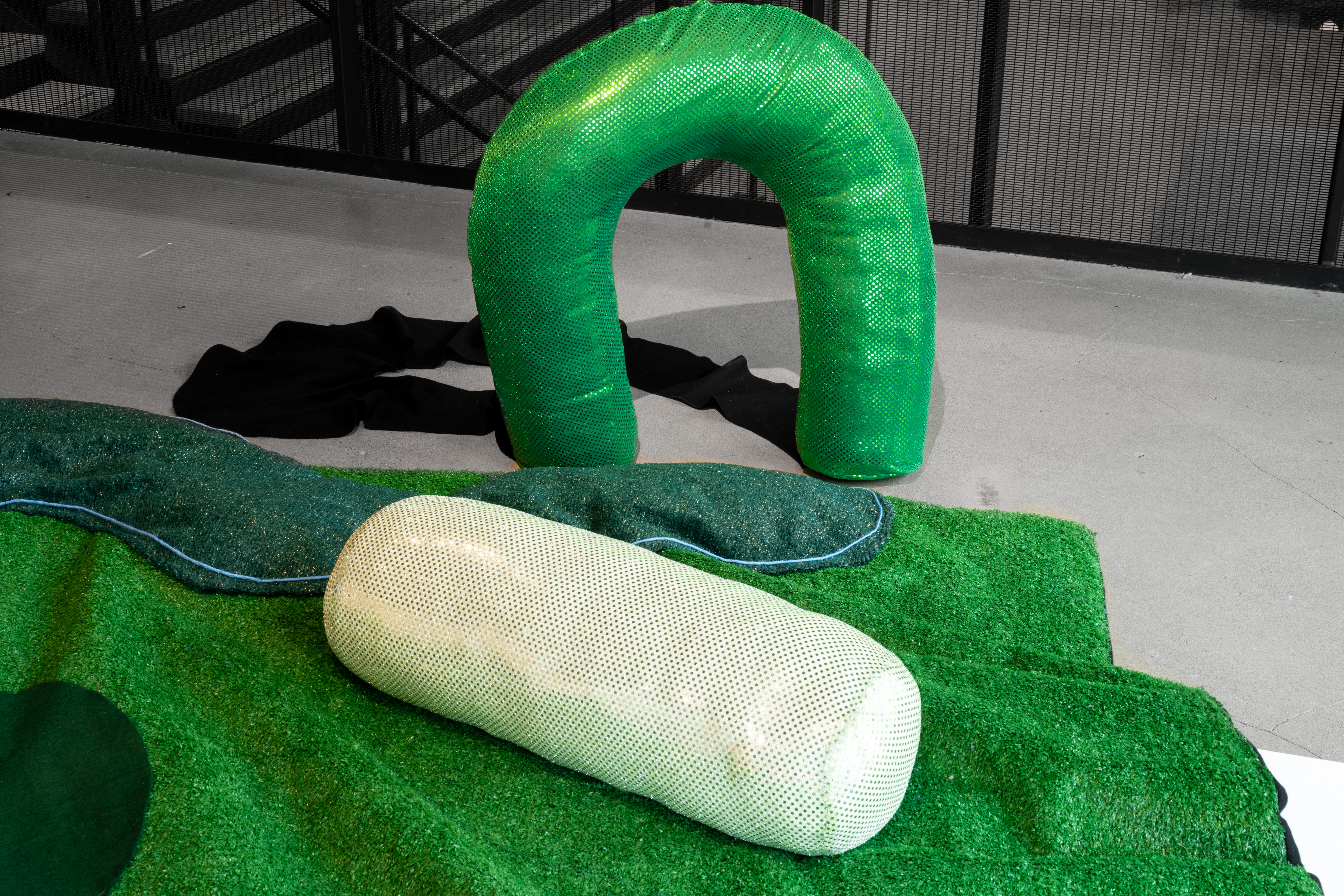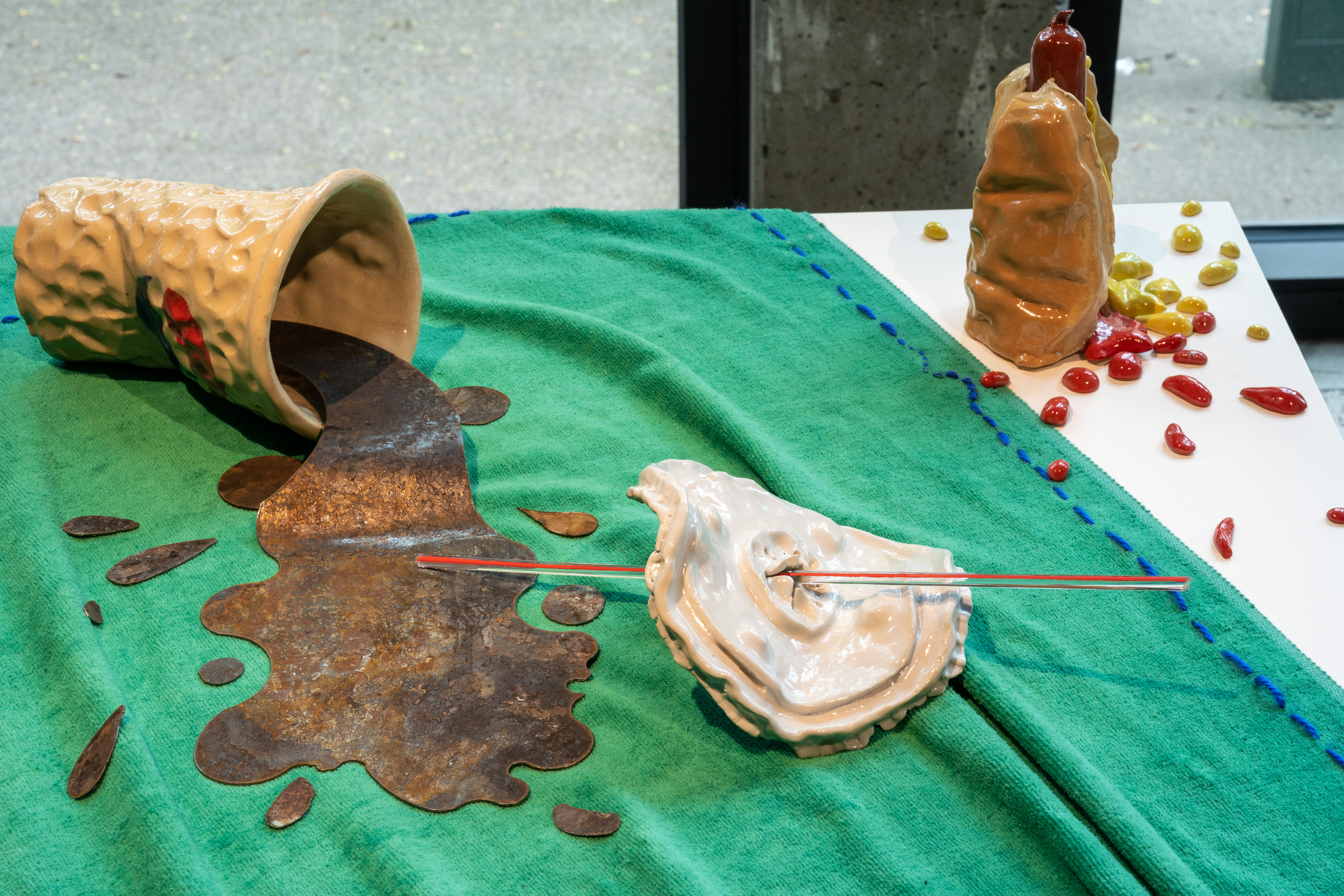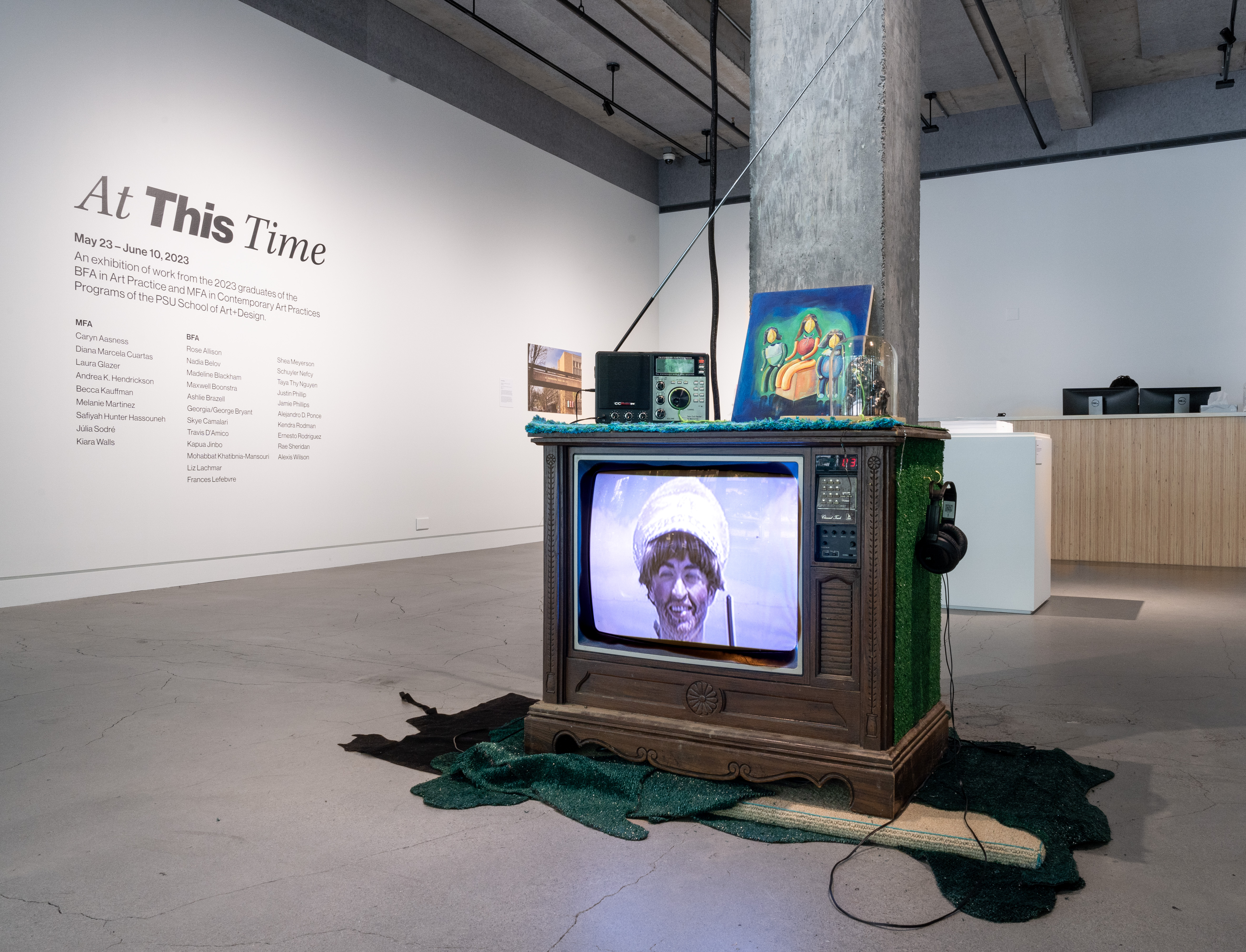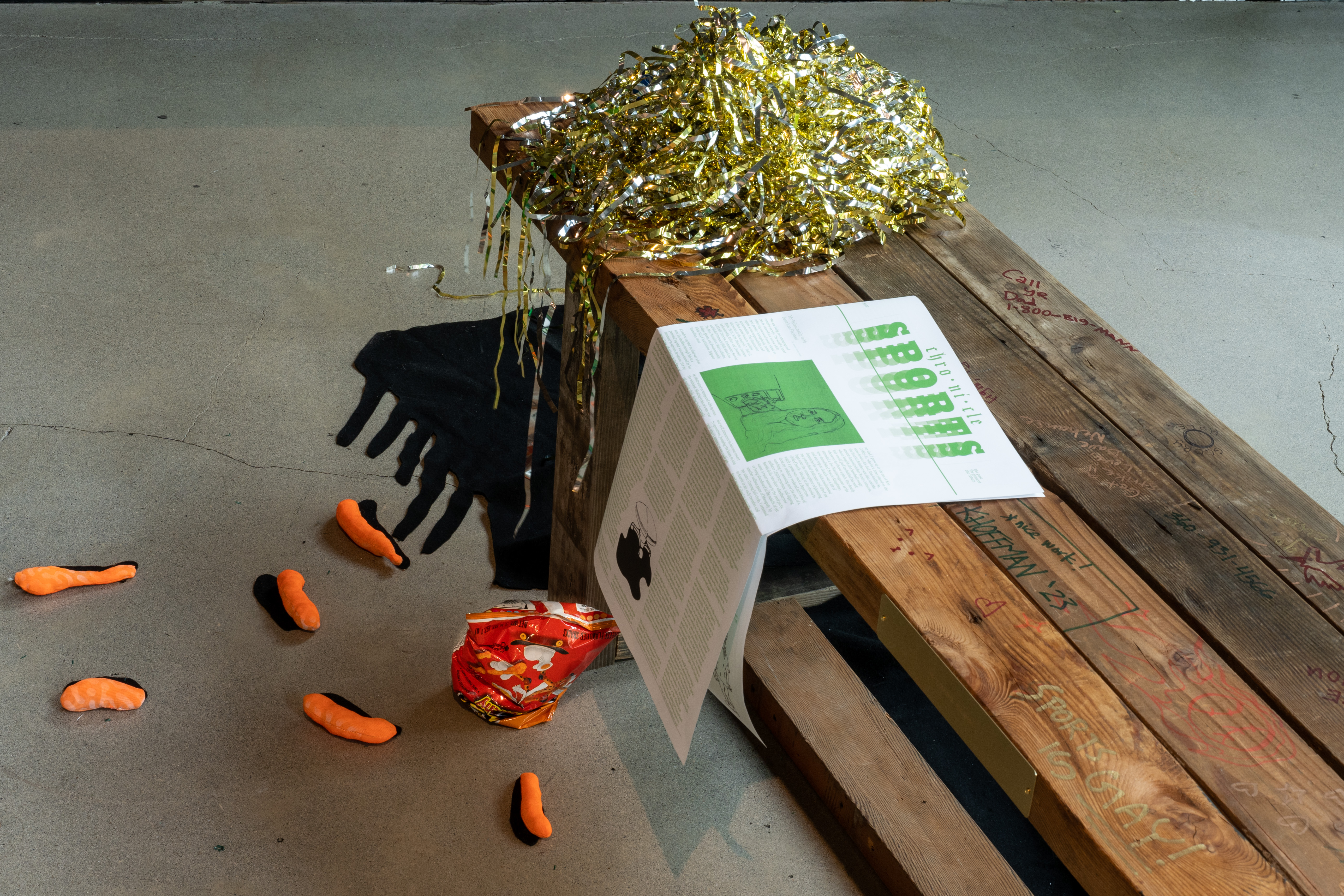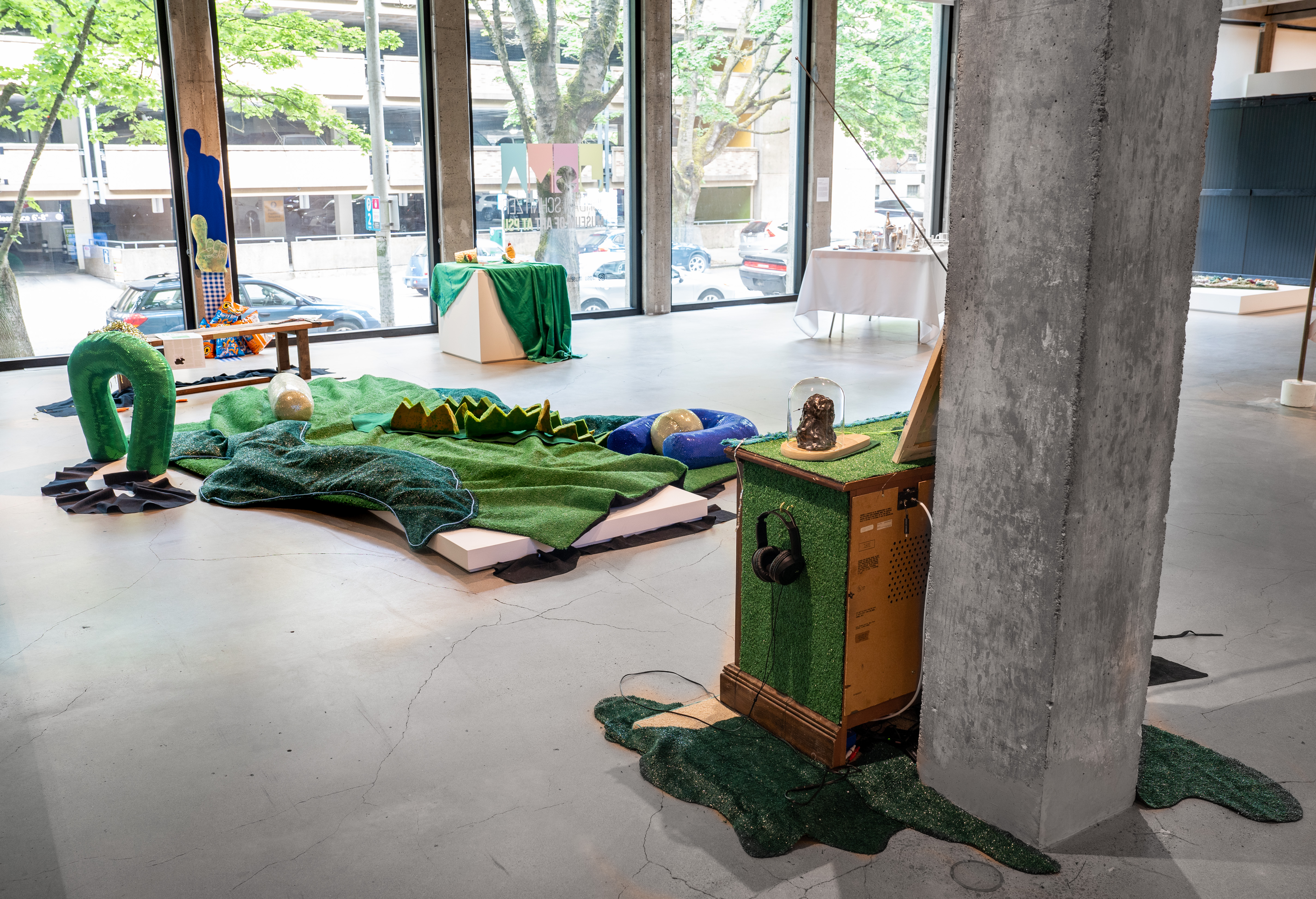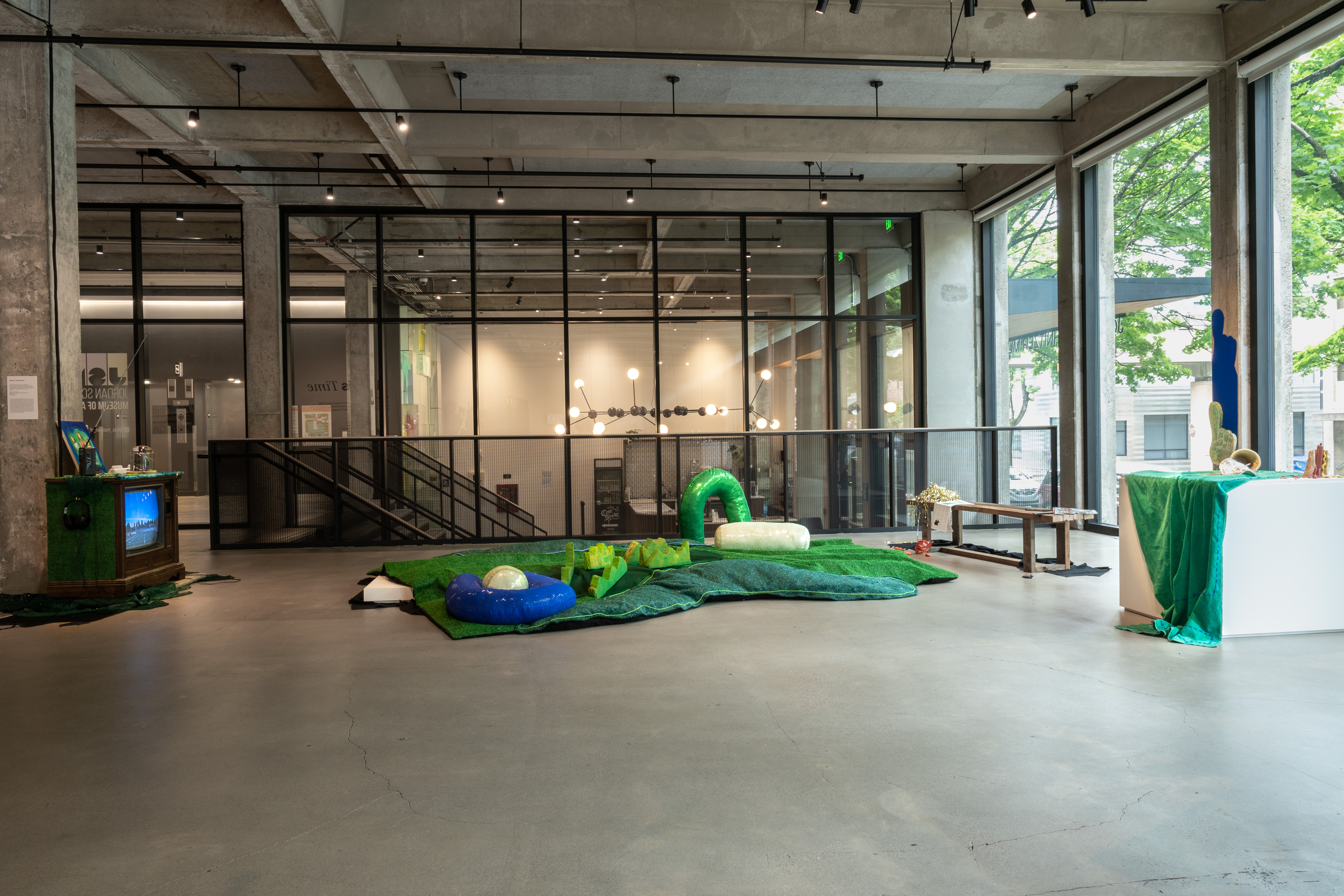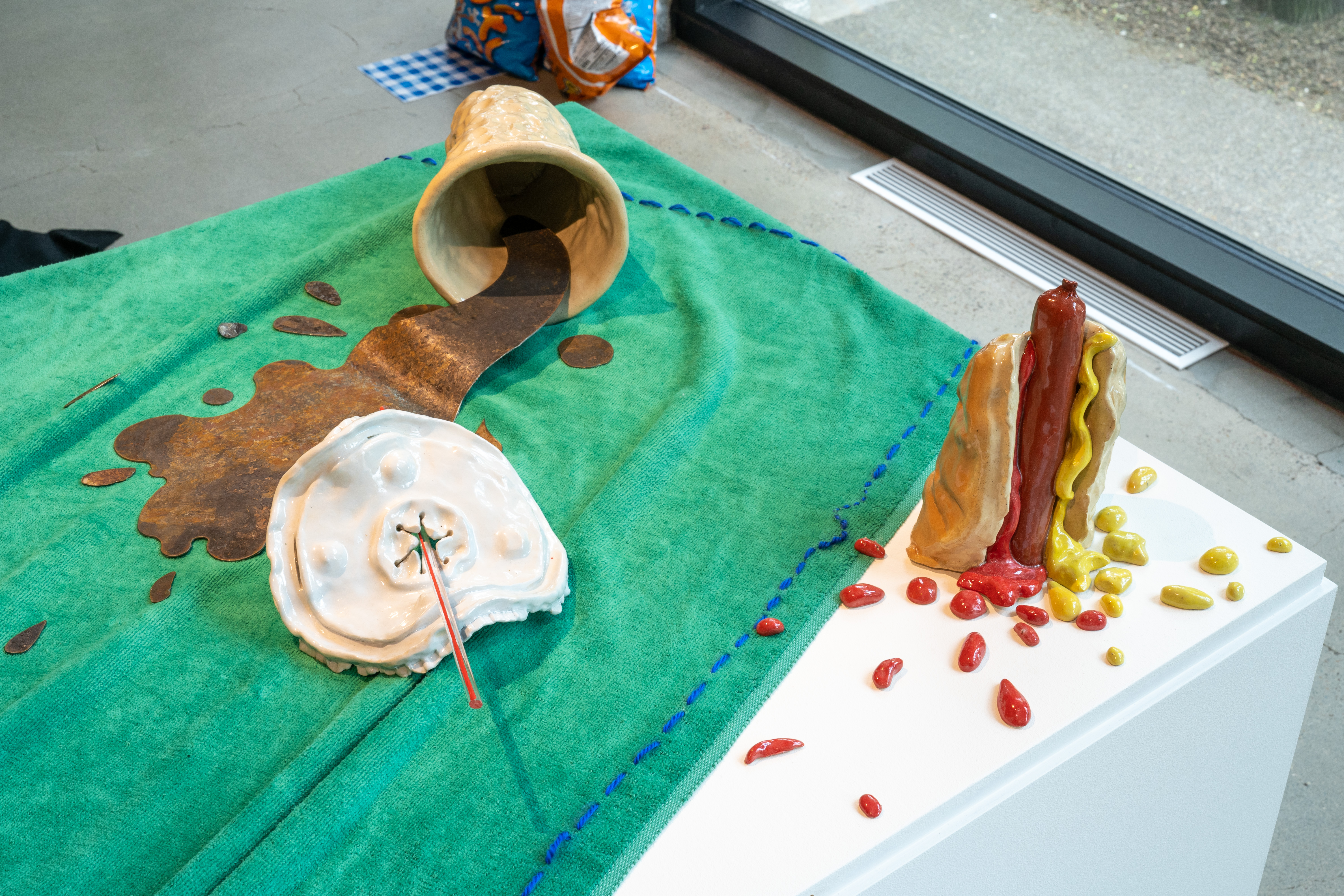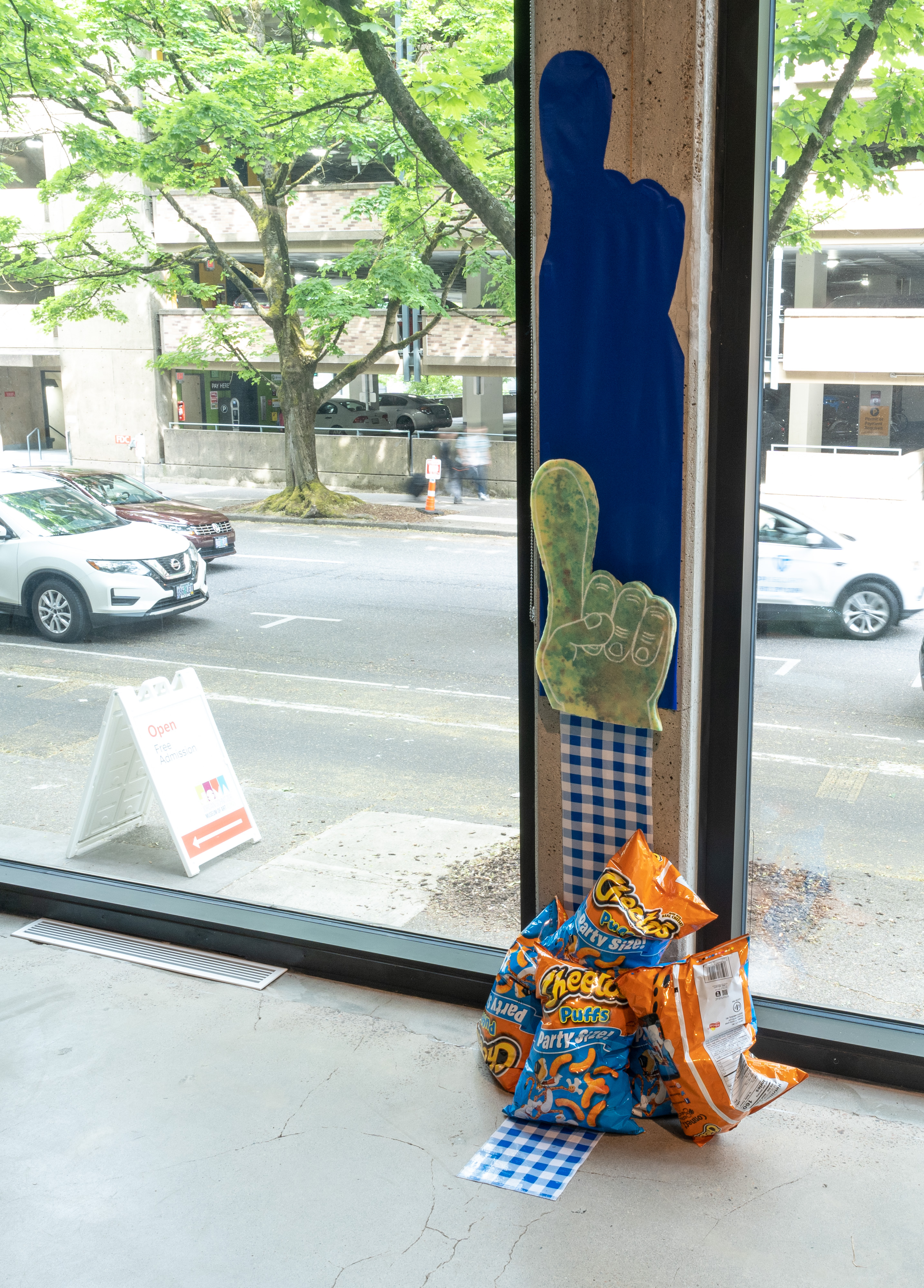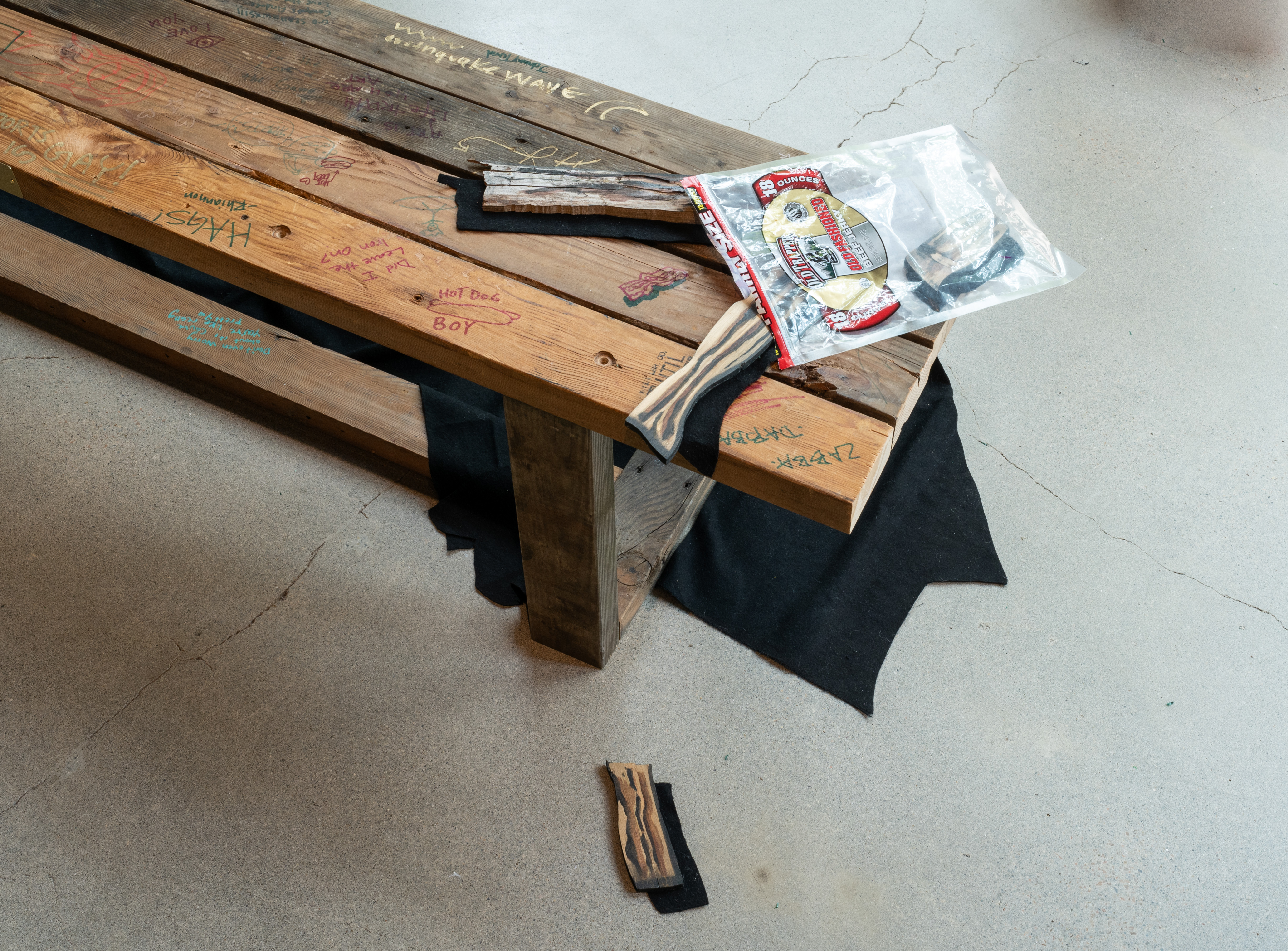
My Relationship with American Football
2023
Mutlimedia installation
My Relationship with American Football is interactive, multi-media installation about mothers, fathers, caretakers and the ways in which their own identities were formed, were influenced by their fathers, mothers, caretakers, and the ways in which they formed and influenced the identities of their succeeding generation.
It’s about the rites of passage as attached to heritage, about forces cultural, societal, systemic, institutional, and personal, about the passage of traumas and our points of intersection within these overlapping, interwoven spaces, their interiors and exteriors. Where do they begin and where do they end?
It is about the passage of my own father, my dad. It is as much a memorial to him, a memorial to and for everyone who encounters it, a memorial for loss and grief in all of its forms…as it is a site for joy and expression. It is my twilight zone, a star trek voyage, a cartoon. It is a game set in the future, hovering in a space that harkens to the past and situates us in the present. It is in a constant state of paradox, just as identity is, just as systems are, just as life is. These paradoxes, these contradictions, are the very reason I made this piece. How can I be so repelled and yet attracted to a brutal game that is based on othering people sharing many of my identities? How can men continually call into a sports radio show looking for validation, knowing they’ll be belittled, and continue calling in anyway? How can a game based on glorifying violence successfully convince mothers to lobby for the right of their sons to play the big game. How do we engage with these contradictions that live within ourselves and outside of ourselves? Where do these points meet within us, where do we intersect in relation to others?
The ways we are socialized are such strong forces, it's hard to know who we really are, which is why we hit identity roadblocks as we grow older. One way this plays out is that the pressures to be cis-gendered and heteronormative are so great, that it is inspiring when anyone is able to voice that those embedded cultural norms are just that, embedded cultural norms, perpetuated by tradition, enforced by fundamentalism in its many forms, and that those descriptions of identity do not fit them. So, with those strong forces in place that have been implicitly and explicitly passed down from generation to generation, how do we really know who we are? What happens to our own identities when we examine these gravities that define us?
2023
Mutlimedia installation
My Relationship with American Football is interactive, multi-media installation about mothers, fathers, caretakers and the ways in which their own identities were formed, were influenced by their fathers, mothers, caretakers, and the ways in which they formed and influenced the identities of their succeeding generation.
It’s about the rites of passage as attached to heritage, about forces cultural, societal, systemic, institutional, and personal, about the passage of traumas and our points of intersection within these overlapping, interwoven spaces, their interiors and exteriors. Where do they begin and where do they end?
It is about the passage of my own father, my dad. It is as much a memorial to him, a memorial to and for everyone who encounters it, a memorial for loss and grief in all of its forms…as it is a site for joy and expression. It is my twilight zone, a star trek voyage, a cartoon. It is a game set in the future, hovering in a space that harkens to the past and situates us in the present. It is in a constant state of paradox, just as identity is, just as systems are, just as life is. These paradoxes, these contradictions, are the very reason I made this piece. How can I be so repelled and yet attracted to a brutal game that is based on othering people sharing many of my identities? How can men continually call into a sports radio show looking for validation, knowing they’ll be belittled, and continue calling in anyway? How can a game based on glorifying violence successfully convince mothers to lobby for the right of their sons to play the big game. How do we engage with these contradictions that live within ourselves and outside of ourselves? Where do these points meet within us, where do we intersect in relation to others?
The ways we are socialized are such strong forces, it's hard to know who we really are, which is why we hit identity roadblocks as we grow older. One way this plays out is that the pressures to be cis-gendered and heteronormative are so great, that it is inspiring when anyone is able to voice that those embedded cultural norms are just that, embedded cultural norms, perpetuated by tradition, enforced by fundamentalism in its many forms, and that those descriptions of identity do not fit them. So, with those strong forces in place that have been implicitly and explicitly passed down from generation to generation, how do we really know who we are? What happens to our own identities when we examine these gravities that define us?
Photos: Simone Fischer
Sports, akin to religion, have a large draw and following throughout the world. And in the U.S., this is especially true of American football. It is a sport that is part of popular culture whose league draws in billions of dollars a year, where countless fans go to escape, to seek levity, to forget, to focus on the game that is happening in front of them. It is a place of ultimate contradiction, where power is wielded in many forms, by the largely white leadership, coaching roster, administration, and by the majority Black, at 70%, athlete roster. It is a place that many people grasp onto as an a-political holdout, when it is the very model of the ways in which politics play out under capitalism. It has a history of racism, anti-Blackness, sexism, homophobia, transphobia, and reinforces patriarchal, white supremacist culture, and is attached, like international football, or soccer, to increases in domestic violence, especially when teams lose. It is also an event where families and friends gather together to drink beer and eat hot dogs, to have a sense of community and root for a team, members of a team, no matter how their identities are implicated.
It is the vastness of intersectionality that plays out in this sphere that I could not stop thinking about as I was listening to an AM sports station on the radio that me and my partner inherited from my dad. It is a place where people gather because we know that millions of other people are gathering and watching at the same time, and it gives us a sense of connection, that we are part of something. Some people ignore its existence all together and others rely on it as a form of community, of entertainment. And yet others as a form of escapism, and at the same time, this industry, which cares about profit in the end, reinforces systems of inequality and problematic social structures, and helps perpetuate them. This is the dichotomy I am interested in, that we all engage with in life. What stronghold does this industry have on the culture of American society, and where is it going?
What happens if we pay attention to it, and what happens if we don’t?
Sports, akin to religion, have a large draw and following throughout the world. And in the U.S., this is especially true of American football. It is a sport that is part of popular culture whose league draws in billions of dollars a year, where countless fans go to escape, to seek levity, to forget, to focus on the game that is happening in front of them. It is a place of ultimate contradiction, where power is wielded in many forms, by the largely white leadership, coaching roster, administration, and by the majority Black, at 70%, athlete roster. It is a place that many people grasp onto as an a-political holdout, when it is the very model of the ways in which politics play out under capitalism. It has a history of racism, anti-Blackness, sexism, homophobia, transphobia, and reinforces patriarchal, white supremacist culture, and is attached, like international football, or soccer, to increases in domestic violence, especially when teams lose. It is also an event where families and friends gather together to drink beer and eat hot dogs, to have a sense of community and root for a team, members of a team, no matter how their identities are implicated.
It is the vastness of intersectionality that plays out in this sphere that I could not stop thinking about as I was listening to an AM sports station on the radio that me and my partner inherited from my dad. It is a place where people gather because we know that millions of other people are gathering and watching at the same time, and it gives us a sense of connection, that we are part of something. Some people ignore its existence all together and others rely on it as a form of community, of entertainment. And yet others as a form of escapism, and at the same time, this industry, which cares about profit in the end, reinforces systems of inequality and problematic social structures, and helps perpetuate them. This is the dichotomy I am interested in, that we all engage with in life. What stronghold does this industry have on the culture of American society, and where is it going?
What happens if we pay attention to it, and what happens if we don’t?

